Edie Melson's Blog, page 17
April 24, 2025
4 Best Writerly Games for Fun and Enrichment

by Lori Hatcher
Do you ever take writing so seriously that you forget to have fun?
I see those hands. And one of them is attached to my arm.
Deadlines, edits, critiques, and marketing. Word count, AI, and brainstorming. Piled in heaps around my computer sit half-finished projects, idea lists, unanswered emails, and unwritten thank you notes. Sometimes the work of writing squeezes out all the fun.
This should not be!
How about, for a few minutes, we set aside our work and have some fun? Below is a list of writerly wordly games my fellow writers and I enjoy. My family likes them too. (I’m hoping at least one of them will become a writer.) I’ve included Amazon links for more information, but don’t forget to check Thrift stores for a bargain.
Fun Games for Writers Codenames (Ages 10+)
My husband and I learned to play this game during the pandemic when we were desperate to connect with others and limited to Zoom calls and Facetime. The concept is simple yet brilliantly strategic. You must give one-word clues to connect multiple words on the board while avoiding the opposing team’s words (and the dreaded assassin). The game makes you think creatively and leverage every inside joke you have with your teammates. The creators just came out with a brand new two-person version.
The Bible Is Funny (Ages 8+)
Here’s how Amazon describes this hilarious game:
Since Bible verses are always being taken out of context, why not make a game of it? With 70 prompts and 165 Bible verses spread out across 200 cards, the game invites players with an abundance of Bible knowledge as well as those with no prior Bible experience to match out-of-context biblical verses with prompts about everyday situations to win the funniest pairing.
Here’s an example:
An excuse I would use to get out of going somewhere...
I am very old. Joshua 23:2
My breath is offensive. Job 19:17
My back is filled with searing pain; there is no health in my body. Psalm 38:7
The verse cards in the deck feature obscure, humorous, or downright outrageous Bible verses pulled completely out of their original context. The prompt cards offer fun, contemporary situations into which those Bible verses can be inserted, with topics ranging from family dynamics and dating to popular culture and the workplace. Perfect for families, friends, and small groups.
Tapple (Ages 8+)
Play centers around a wheel with alphabetical keys. Take a category card from the stack, announce the category, and tap the timer button in the center of the TAPPLE wheel. On your turn, you have 10 seconds to name an answer for the category starting with an available letter on the TAPPLE wheel. Press the first letter of your answer, tap the button to reset the timer, and pass the turn. Letters pressed can no longer be used for the round, so the pressure mounts as letters are eliminated. Continue play until a player collects three cards and wins.
Taboo (Ages 13+)
This classic game tests your thesaurus abilities. Divide into two teams, activate the one-minute timer, flip a card over, and try to make your team say the word on the card without using any of the taboo words. You might get a word like Bacon. Try to describe it without saying pork, breakfast, crispy, pig, or lettuce and tomato. If you say one of the forbidden words, the opposing team buzzes you, and you move on to the next word. The team who guesses the most words in several rounds wins.
I could go on forever sharing favorite games (Boggle, Bananagrams, Scattergories). For wordsmiths, nothing is more fun than jousting with the swords of the English language. A well-designed and well-played game will almost always leave you smarter and smiling. Leave a comment below and share your favorite wordly games.
TWEETABLE4 Best Writerly Games for Fun and Enrichment from Lori Hatcher on @EdieMelson (Click to Tweet)
 Lori Hatcher is a freelance editor, writing instructor, and author of six devotionals with Our Daily Bread Publishing. Her latest book, Think on These Things: 60 Thoughtful Devotions for Renewed Peace, released this month. Lori writes for Revive Our Hearts, Focus on the Family, The Upper Room, and Crosswalk.com. A frequent instructor at writers conferences around the country, Lori loves nothing better than helping other writers polish and perfect their craft. Connect with her at www.LoriHatcher.com.
Lori Hatcher is a freelance editor, writing instructor, and author of six devotionals with Our Daily Bread Publishing. Her latest book, Think on These Things: 60 Thoughtful Devotions for Renewed Peace, released this month. Lori writes for Revive Our Hearts, Focus on the Family, The Upper Room, and Crosswalk.com. A frequent instructor at writers conferences around the country, Lori loves nothing better than helping other writers polish and perfect their craft. Connect with her at www.LoriHatcher.com.
April 23, 2025
First Page Critique
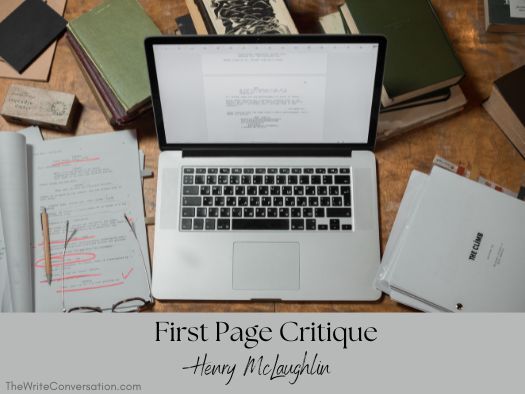
by Henry McLaughlin @RiverBendSagasToday, I’m sharing the first page of a story from a brave author, who shall remain anonymous. It’s a story about a soldier returning from Vietnam. My critique follows the original.
Berkton, IndianaJune 1970
Leith Fleming stared up at the small-town church building before him, taking in the familiar sight of the peeling blue paint and the tall, white steeple. The double doors were open, and people, dressed up in their Sunday best, streamed in, talking and laughing.
“Whatcha waitin’ for?” Mary asked, and Leith looked over at his wife and grinned.
“Just thinking about how everything’s just as it was before. See? Mrs. Gladford’s even wearing that same yellow dress that makes her look like a duck.”
“Leith!” Mary exclaimed, sounding both appalled and amused.
“Weawy?” Noah asked, his blue eyes going wide. “She’s a duck?”
“Now look what you’ve done, you chump,” Mary scolded. “No, Noah. Mrs. Gladford is not a duck.”
The three-year-old looked disappointed. “Oh.”
Leith just laughed. “Com’on, we’d better hurry, or they’re gonna start without us.” He started forward, ignoring Mary’s muttered comment about how she wasn’t the one wasting time calling people ducks.
But even as they settled in their pew, Leith couldn’t help but feel as if something was... off. He’d expected more of a greeting after being gone for a year, yet only a few people had acknowledged him back
After the sermon, Leith and his family joined the stream of people filing out of the church. There was a picnic, so everyone headed to the long, food-loaded tables set up on the lawn.
Balancing a plate in one hand and a cup of lemonade in the other, he squinted in the bright June afternoon light and scanned the crowd for his family. He quickly spotted them sitting under the sprawling oak, Mary trying to have a conversation with another lady, all while juggling a plate full of food and a restless Noah.
Leith headed over with a grin tugging at his mouth. Carefully setting his food down on the grass, he scooped Noah up and hoisted him with ease onto his shoulders. The boy giggled with glee, wrapping his small hands around the front of Leith’s shirt.
At the sound of Noah’s laugh, Mary looked up. Her gray-blue eyes twinkled at the sight, and a smile lit up her round, pretty face.
My critique:Berkton, IndianaJune 1970 Good way to anchor us in place and time
This story has a strong beginning. You plant seeds of tension and foreshadowing nicely. A very real part of the culture in 1970s was soldiers weren’t honored or treated with respect. I like the hint of PTSD. Very subtle plant—well done.
The major criticism is I think the writing could be tighter. Some words are unnecessary or redundant.
Leith Fleming stared up at the small-town church building unnecessary word--readers will know it’s a building before him, taking in the familiar sight of redundant after ‘stared’ the tighten peeling blue paint and the tall, white steeple. The double doors were open, and people, dressed up tighten in their Sunday best, streamed in, talking and laughing.
“Whatcha waitin’ for?” Mary asked. and Leith looked over at his wife and grinned.
Keith grinned at his wife. “Just thinking about how everything’s just as it was before. See? Mrs. Gladford’s even wearing that the same yellow dress that makes her look like a duck.”
“Leith!” Mary exclaimed, sounded both appalled and amused.
“Weawy?” this word stopped me before I figured out Noah has a speech impediment— ‘weally’ might fit betterNoah asked, his blue eyes going unnecessary wide. “She’s a duck?”
“Now look what you’ve done, you chump,” Mary scolded. “No, Noah. Mrs. Gladford is not a duck.”
The three-year-old looked disappointed. “Oh.”
Leith just ‘just’ is a filler word and usually doesn’t add anything to the story laughed use ‘chuckled’ to break up using ‘laughed’ too often. “Com’on C’mon, we’d better hurry, or they’re gonna start without us.” He started forward, ignoring Mary’s muttered comment about how she wasn’t the one wasting time calling people ducks.
But even tighten As they settled in their pew, Leith couldn’t help but feel as if something feels wordy feeling something was...off. He’d expected more of a greeting after being gone for a year, yet only a few people had passive verbacknowledged him back feels vague his return from the war.
After the sermon, Leith and his family joined the stream used this word earlier flow of people filing out of the church. There was a picnic. Everyone headed to the long, food-loaded tables set up on the lawn.
Balancing a plate in one hand and a cup of lemonade in the other, he squinted in the bright June afternoon light and scanned the crowd for his family. He quickly spotted them sitting under the sprawling oak, Mary trying to have a conversation with another lady, all tighten while juggling a plate full of food and a restless Noah.
Leith headed over with toward them, a suggestion for word flow a grin tugging at his mouth. Carefully setting his food down on the grass, he scooped Noah up and hoisted him Noah with ease onto his shoulders. The boy giggled with glee feels redundant, wrapping his small hands around the front of Leith’s shirt. Hard to visualize if he’s on his dad’s shoulders wrapping his small hands under his daddy’s chin..
At the sound of Noah’s laugh, Mary looked up. Her gray-blue eyes twinkled, and a smile lit her round, pretty face.
And here is the revised version incorporating my suggestions:
Leith Fleming stared at the small-town church, taking in the peeling blue paint and the tall, white steeple. The double doors were open, and people, dressed in their Sunday best, streamed in, talking and laughing.
“Whatcha waitin’ for?” Mary asked.
Keith grinned at his wife. “Just thinking about how everything’s just as it was. Mrs. Gladford’s even wearing thesame yellow dress that makes her look like a duck.”
“Leith!” Mary sounded both appalled and amused.
“Weally?” Noah asked, his blue eyes wide. “She’s a duck?”
“Now look what you’ve done, you chump,” Mary scolded. “No, Noah. Mrs. Gladford is not a duck.”
The three-year-old looked disappointed. “Oh.”
Leith chuckled “C’mon, we’d better hurry, or they’re gonna start without us.” He started forward, ignoring Mary’s muttered comment about how she wasn’t the one wasting time calling people ducks.
As they settled in their pew, Leith couldn’t help feeling something was... off. He’d expected more of a greeting after being gone for a year, yet only a few people acknowledged his return from the war.
After the sermon, Leith and his family joined the flow of people filing out of the church. There was a picnic. Everyone headed to the long, food-loaded tables set up on the lawn.
Balancing a plate in one hand and a cup of lemonade in the other, he squinted in the bright June afternoon light and scanned the crowd for his family. He spotted them sitting under the sprawling oak, Mary trying to have a conversation with another lady, while juggling a plate full of food and a restless Noah.
Leith headed toward them, a grin tugging at his mouth. Carefully setting his food on the grass, he hoisted Noah with ease onto his shoulders. The boy giggled, wrapping his small hands under his daddy’s chin.
At the sound of Noah’s laugh, Mary looked up. Her gray-blue eyes twinkled, and a smile lit her round, pretty face.
What are your thoughts about the changes I suggest? What did I miss? What would you have done differently?
TWEETABLEFirst Page Critique from Henry Mclaughlin (@RiverBendSagas) on @EdieMelson (Click to Tweet)
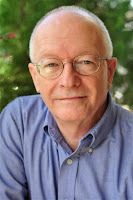 Henry’s debut novel, Journey to Riverbend, won the 2009 Operation First Novel contest.
Henry’s debut novel, Journey to Riverbend, won the 2009 Operation First Novel contest.Henry edits novels, leads critique groups, and teaches at conferences and workshops. He enjoys mentoring and coaching individual writers.
Connect with Henry on his BLOG, TWITTER and FACEBOOK.
April 22, 2025
Writing Research isn’t for the Fainthearted
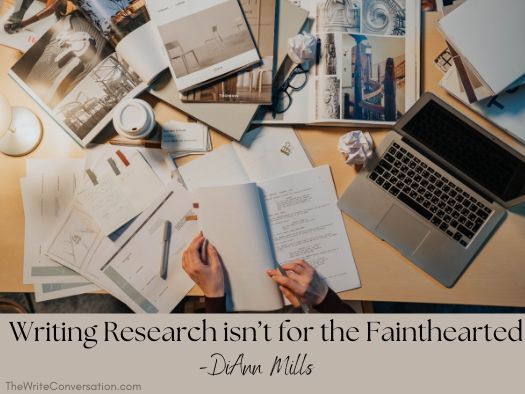
by DiAnn Mills @DiAnnMills
Researching a novel is exciting, fun, educational, unpredictable, and sometimes dangerous. A writer who explores research, explores life—and life is story. Readers deserve an unforgettable adventure that touches hearts and lives.
If a manuscript isn’t accurate, and credible, the reader will recognize the flaw and toss the story aside. We want to be rewarded with good reviews and more readers.
What does a writer need to carry out authentic research?1. A positive attitude.2. A temporary personality from an introvert to an extrovert.3. An inquisitive mind that focuses on a character. 4. A wild-child streak.
Albert Einstein said, “If we knew what we were doing, it would not be called research, would it?”
Authentic fact-finding enlists sensory perception, and the results draw readers into our story. During a research visit, take lots of notes, snap pics, and record details.
See
What the writer sees while conducting research takes on many dimensions. Seeing physically means documenting details the writer deems necessary about the story world—yet knowing only one or two items will be necessary.
Sight is not limited to the physical realm. Consider what’s in the mind’s eye. A writer’s imagination weaves what she sees with how she will use the information.
Logic is another part of seeing the setting. Will the information build realism and story credibility?
Hear
What does the writer hear? Listen to the sounds of nature. Study the culture, the unique vocabulary, subtleties, laughter, and tears. Writers tune their ears to the dialect of the people within the setting.
Taste
Food and drink bring a richness to our writing. Ever watched a travel show? By showing a restaurant, a food vendor, or a meal in someone’s home, we offer awareness of that culture. The character’s experience with unusual tastes can also evoke fear and confusion.
Smell
The sense of taste and smell weave memories for us and our characters—enjoyable and offensive. The link often means the two are inseparable.
Touch
Researching through touch means brushing our fingers across the vegetation, dipping our feet into the water, petting an animal, or embracing someone. Pick up a baby or hold a hand. Laugh. Cry. Touch pulls us into someone else’s world. This may be challenging, but it always brings a reward.
When physical research isn’t possible.
Sometimes the writer can’t visit a story’s setting, especially in non-contemporary genres. Libraries hold a wealth of information. Websites offer incredible insight but verify the information in at least three places before documenting it in your story. Pick up the phone and call the area.
Be sensitive to the area. Use fictitious names and places to avoid offending the residents. A writer wouldn’t want a serial murder living on a real street or citing damaging information about prominent people and places.
A Detailed Checklist to Conduct Effective and Efficient Writing Research
1. Conduct a web search of the area. Some apps will help you with this: Google Maps, Google Earth, Weather Bug, or travel sites that can be found via apps or websites.
2. Take or download more pictures than you think you’ll ever use. *Remember if online images are used beyond personal research purposes, use a royalty-free sight like pixabay.
3. Interview people living in the area. For a historical setting, this also means reading diaries and journals. How has history affected the community?
4. Listen to local people talk. Do they use a distinct vocabulary? Journal these distinctions.
5. What are the community’s values and expectations for life and each other?
6. What is their diet? How much of their food supply is local?
7. How is the area governed?
8. What are the local hotels? Restaurants? What’s featured on the menus? Any daily specials?
9. What are the sources of local entertainment?
10. How do the residents celebrate holidays?
11. Does the community have special festivals?
12. How does the area experience the seasons, and what are the average temperatures?
13. What are the medical concerns? What kind of medical care is available?
14. What is their living situation (e.g., house, apartment, cabin, etc.)?
15. Where do they shop?
16. How do the people dress?
17. Do the arts play a role in the community?
18. How do locals view education, sports teams, and favorite colleges?
19. How do the residents earn a living?
Other Considerations
21. If the area is near a national or state park, look for research material in
the visitors’ section or at the chamber of commerce.
22. Discover the wildlife and birds of the region.
23. Study the types of trees and wildflowers.
24. Locate a map of the area.
25. Visit the local library. View newspaper archives.
26. Does politics play a role?
27. What churches and other religious affiliations are in the area?
28. Look for documentaries about the area.
29. What are the people’s joys?
30. What do people fear?
Research is not about the writer’s display of their knowledge, but an opportunity for readers to experience the story through the eyes of characters who live and walk an adventure. Use only the information needed in the character’s point of view.
How do you conduct writing research?
TWEETABLEWriting Research isn't for the Fainthearted from @DiAnnMills on @EdieMelson (Click to Tweet)
 DiAnn Mills is a bestselling author who believes her readers should expect an adventure. She creates action-packed, suspense-filled novels to thrill readers. Her titles have appeared on the CBA and ECPA bestseller lists; won two Christy Awards; and been finalists for the RITA, Daphne Du Maurier, Inspirational Readers’ Choice, and Carol award contests.
DiAnn Mills is a bestselling author who believes her readers should expect an adventure. She creates action-packed, suspense-filled novels to thrill readers. Her titles have appeared on the CBA and ECPA bestseller lists; won two Christy Awards; and been finalists for the RITA, Daphne Du Maurier, Inspirational Readers’ Choice, and Carol award contests. She is the former director of the Blue Ridge Mountain Christian Writers Conference, Mountainside Marketing Retreat, and Mountainside Novelist Retreat with social media specialist Edie Melson. Connect here: DIANNMILLS.COM
April 21, 2025
Dipping the Quill Deeper: Humble Beginnings (Part 3)
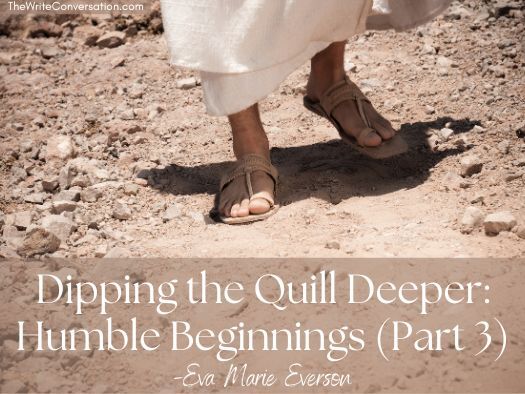
by Eva Marie Everson @EversonAuthor
In looking at stories of “humble beginnings,” such as those I have shared over the past two months, I came across this inspiring tale.
The year was 1939. November to be exact—and the Christmas season was joyously coming in. Inspired by all he saw, a writer named Philip Van Doren wrote a short story titled “The Greatest Gift,” which he then tried to sell to publishers.
Sadly, no one was interested.
Undaunted, he created a 24-page pamphlet and gifted copies to family and friends during the Christmas season of 1943. (If you are doing the math, this means that Mr. Van Doren had tried to sell his work for four years without a bite.)
Sometime later, celebrated actor Cary Grant received a copy of the pamphlet. He liked it so much that he showed it to his agent who decided to try to shop it—this time not to publishing houses but rather to movie producers.
The following year, RKO Pictures purchased the rights to the story, paying Van Doren $10,000. Today, that would be an option payment of over $175,000. Not bad for a storyline that couldn’t get a publisher, don’t you think?
RKO hired several writers to turn the short story into a feature film, but none of their adaptations caught the vision of the inspirational holiday plotline. The option for turning The Greatest Gift into a movie was shelved.
Years later, director Frank Capra read the story and saw its potential. He did the necessary research and discovered that several movie scripts sat on the shelves of RKO, who he offered another $10,000 to for the rights.
RKO sold the rights and the screenplays to Capra. But Capra scraped the screenplays and hired new writers. Armed with a suitable script, Capra began filming in April 1946 with a plan to release the movie in December of that same year.
(Again, if you are doing the math, seven years have now passed since Van Doren wrote his little story.)
The movie released . . . and it bombed, losing $525,000, which is a whopping $7,706,634 in today’s figures.
Oh well, Mr. Capra. You win some, you lose some.
Right?
Wrong.
In 1951, Paramount purchased Capra’s company, including the shelved, overlooked, under-viewed little film based on Van Doren’s idea. Even though it sat “on a shelf,” every year Paramount had to renew the copyright, which they faithfully did . . . until 1974. In that year, a clerical error failed to file this important paperwork, which meant that TV stations could begin to show the movie.
So it was that, in 1976—30 years after it was written as a short story—It’s a Wonderful Life came to the small screen and, in turn, became a staple of the Christmas season. Remarkably, today, It’s a Wonderful Life is considered to be one of the ten greatest movies of all time.
Is This Really an Unusual Story?
I cannot tell you how often I hear, “I signed a movie deal for my novel . . .” but I never see the movie come to any screen, big or small. Nor does anyone else.
I understand. I’ve done the same. In fact, several times there were hopes for a movie option based on a particular novel I’d written and seen published. I have to be honest with you—I was so excited, I told everyone and their brother, only to be left red-faced when nothing came of any of the opportunities. Sometime later, I had another option offer, only this time I actually signed on the dotted line and cashed the check. Screenplays were written and, beyond excited, I sat and read them, envisioning the moment I would see Based on a Novel by Eva Marie Everson on a screen. This time, however, I waited to tell. In fact, I didn’t even tell my husband until the check had cleared the bank.
Unfortunately, the writers’ strike occurred and my little moment in the sun came and went, died and was buried.
But guess what . . . I found myself fine with it. Do you know why? Stories like Van Doren’s and the knowledge and understanding that if it is supposed to be, God will make a way. It may not be in this decade. It may not be with that film company. But it will be. And if it is not . . . well, how many people can say they signed with a film company?
Many of you have written short stories, blog posts, articles, books, and scripts . . . and you’ve shopped your baby but to no avail. Or perhaps you have signed on the dotted line and cashed the check only to have the excitement slip to disappointment. In this business, that is not an unusual story. In fact, one of my novels (Five Brides) was sold to two publishing houses before it went to print, then shot to #1 on the ECPA Bestseller List. What initially was euphoric had turned to disappointment and then went back to euphoria again. But there’s an even deeper story there . . . a difficult story. My original work—85,000 words told in first person POV—had to be rewritten as a 125,000-word novel told in five third person POVs to suit the publisher. And . . . I had two months to complete the task.
Which I did. I scraped 85,000 words and, two months later, turned in 125,000 words to my editor. Then, many months later, I sat open mouthed as I stared at the bestseller list on my smartphone.
You see, our job is first and foremost to write. God’s job is to determine the best time and place for the work to come to fruition. This doesn’t mean we “shelve” it with hopes that someone will supernaturally come along, see it and say, “What’s that sitting up there?”. Our part is to do our part . . . and once we have done so, we let God do His part.
These are humble beginnings.
TWEETABLEDipping the Quill Deeper: Humble Beginnings (Part 3) @EversonAuthor on @EdieMelson (Click to Tweet)
Don't Miss the Other Posts in this Series! Humble Beginnings, Part 1 Humbler Beginnings, Part 2 Humble Beginnings, Part 3
 Eva Marie Everson is the CEO of Word Weavers International, the director of Florida Christian Writers Conference, and the contest director for the Blue Ridge Mountains Christian Writers Conference. She is the author of almost 50 books, both fiction and nonfiction. Her next novel, Beth Bettencourt, is set for release in 2026 (Kregel). To know more about Eva Marie (or to be added to her Southern newsletter), you can connect with her at www.EvaMarieEversonAuthor.com
Eva Marie Everson is the CEO of Word Weavers International, the director of Florida Christian Writers Conference, and the contest director for the Blue Ridge Mountains Christian Writers Conference. She is the author of almost 50 books, both fiction and nonfiction. Her next novel, Beth Bettencourt, is set for release in 2026 (Kregel). To know more about Eva Marie (or to be added to her Southern newsletter), you can connect with her at www.EvaMarieEversonAuthor.com
April 20, 2025
How to Battle One of a Writer's Worst Enemies—PROCRASTINATION
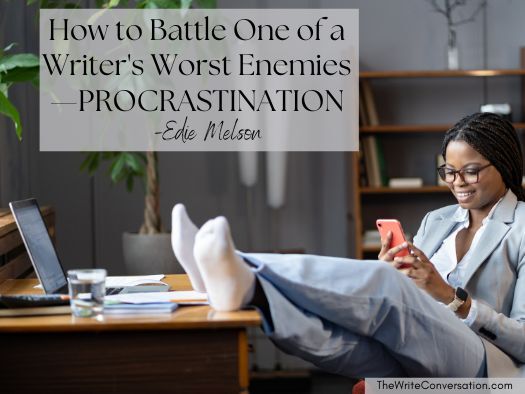
by Edie Melson @EdieMelson
I have confession to make. I am and world class master at procrastination. If I'm on a deadline I can find more things—non writing related—to keep me away from the computer. Some of my favorites include:Cleaning out my shoesOrganizing my craft closetDeep-cleaning the bathroomsRearranging my phone screens and appsPlanting a garden (did I mention I am not and have never been a gardener?)Scheduling a mammogram (okay this one IS important, but normally I should have done it months earlier and I'm now using it as an excuse)I think you get the idea.
Don't get me wrong though. I love writing. And I love talking about writing.
Sitting around with other writers, discussing all things literary is one of my favorite things. It’s one of the reasons I love attending writing conferences.
But there are people we know who like talking about writing so much that’s all they do. They join writers groups, critique groups, even take classes.
The one thing they don’t do is write. And if we're not careful, we can slip into this trap.
Writing is hard work. Avoiding it is often easier than just sitting in the chair and banging out words. There comes a time though, when we have to just quit procrastinating, sit in the chair and write.
My 9 Tips for Battling Writing Procrastination
1. Set a goal. I play games with my goals. Sometimes I’ll set a time goal—I’m going to write for an hour—no matter what. Sometimes I’ll set a word count goal—I’m not going to get up until I’ve written 1000 words.
2. Set a reward. I try to avoid food related goals, but truthfully, nothing helps the words flow like the promise of chocolate. However, the promise of a new pair of shoes after turning in a big project also works for me!
3. Break your project into manageable pieces. Don’t tackle a hard goal all at once. Break it into small manageable bits. This will help you see the progress.
4. Turn on the music. For me, music (instrumental—no words) helps me get in the groove.
5. Change the scenery. When I hit a wall, it helps to go around it—literally. If I’m in my office, I may move to the dining room or even the back porch.
6. Turn off the Internet. Or at least log off your social media. It’s tempting to ask for support or commiseration on Facebook, but it can lead to conversation. And the only words you need are the ones that show up on the page.
7. Schedule a Write-in. Get a friend or two and hold each other accountable. If you can’t meet in person, get together online, through Skype or a Google Hangout.
8. Take part in Writing Sprints. Lynn Blackburn is a huge fan of this (as are others) and here's her blog post, Do You Participate in Writing Sprints?
9. Throw up on the page. NO, not literally. But I’ve found that sometimes I have to write junk before I can get to the good stuff. So go ahead and write crap, get it out of the way and keep going. Chances are there is something useable in it.
Now I’d like to hear from you. What tricks have you found to keep yourself in the chair banging out words?
TWEETABLEHow to Battle One of a Writer's Worst Enemies—PROCRASTINATION from @EdieMelson (Click to Tweet)
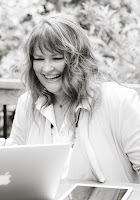 Edie Melson is a woman of faith with ink-stained fingers observing life through the lens of her camera. No matter whether she’s talking to writers, entrepreneurs, or readers, her first advice is always “Find your voice, live your story.” As an author, blogger, and speaker she’s encouraged and challenged audiences across the country and around the world. Her numerous books reflect her passion to help others develop the strength of their God-given gifts and apply them to their lives. Connect with her on her website, through Facebook, Twitter and Instagram.
Edie Melson is a woman of faith with ink-stained fingers observing life through the lens of her camera. No matter whether she’s talking to writers, entrepreneurs, or readers, her first advice is always “Find your voice, live your story.” As an author, blogger, and speaker she’s encouraged and challenged audiences across the country and around the world. Her numerous books reflect her passion to help others develop the strength of their God-given gifts and apply them to their lives. Connect with her on her website, through Facebook, Twitter and Instagram.
April 19, 2025
Have You Invited God into Your Writing?

by Tammy Karasek @TickledPinkTam
Happy Resurrection Day! As believers all over the world celebrate the Risen Jesus, I have a question specifically for you, writers. When you sit down to write, do you ask God to guide your thoughts and words as you begin—or do you write, then ask Him to bless your work?
Years ago, a fellow writer shared with our writing group some interesting facts she’d come across in a recently read book. Often our devotions or book reports shared in our meetings stick with me for a few days as I keep going over them in my mind. But this time, something that was shared has impacted me greatly. It’s often brought to mind to this day.
As Christian writers we should pray before we start a new project asking God to give us the words he’d have us share. Again, we ought to pray as we sit down to actually do the writing of said project. We know we’ve been called to write and want to walk in that obedience. Our intentions are to write what we feel God leading us to do.
And then we get to the business of writing on our terms, our schedule and eventually our thoughts and words.
Maybe on the first day we begin the project we will pray. Soon, we think of deadlines and our schedules and hurry into our writing without our pause for prayer first. We can inadvertently in our haste to complete the project do it our own way. I believe someone named Frank sang about doing it my way. I can’t answer for you, but I can honestly say that is me more than I like to admit. Doing it my way.
However, since that particular writing group meeting, I’ve approached my writing in a much different way. Anyone heard of conviction? Try as I might, I am guilty for not inviting God into my writing time. (And I wonder why I have writer’s block at times.) Now, I have two sets of letters on my screen in bright pink (of course!) post-its. One on the top left and one on the top right. The one on the left is TLK/JJ. The one on the right is TLK/SDG.
Initials to remind me whose help I need and who receives all the credit.
Oh, let me tell you about those initials, they do make me excited and I can’t wait for you to hear about them. You’ve probably heard of someone named Johann Sebastian Bach. What I never knew about Mr. Bach was he had a strong faith. So much so, no matter whom he was writing his music for he would start composing by petitioning Christ to help him with it. Not only requesting the Lord’s help before he began—once done, he would give the credit to God.
Boom—mind blown. Yours, too?
At the beginning of his musical compositions, it has been said that Mr. Bach would sometimes write the letters JJ for Jesu juva—Latin for Jesus, help. Then he would begin.
Once done, he would add the initials SDG, Soli Deo Gloria, at the end which he meant that all of his work was done for the glory of God alone.
It was these simplistic prayers of Johann Sebastian Bach that impacted me to create the habit of saying out loud Jesus help as I reach over to turn on my computer to work. Then to bookend my work time to be ended with Soli Deo Gloria, for the glory of you alone, God.
I pray this will encourage you to invite God into your writing and cover your time with the help of Jesus. Then once your session is done you remember who gets the glory . . .
Soli Deo Gloria.
What about you, sweet writer friend? Do you invite God into your writing as you sit down to each writing session? Then for all the words you’ve added to your word count for the day, do you give HIM all the glory? Let’s talk about it in the comments below.
He is Risen!
TWEETABLEHave You Invited God into Your Writing? from @TickledPinkTam on @EdieMelson (Click to Tweet)
 Tammy Karasek uses humor and wit to bring joy and hope to every aspect in life. Her past, filled with bullying and criticism from family, drives her passion to encourage and inspire others and give them The Reason to smile. She’s gone from down and defeated to living a “Tickled Pink” life as she believes there’s always a giggle wanting to come out! A writer of Romance—with a splash of sass. She’s also The Launch Team Geek helping authors launch their books and also a Virtual Assistant for several best-selling authors. Don't miss her recent book, LAUNCH THAT BOOK, just released in November.
Tammy Karasek uses humor and wit to bring joy and hope to every aspect in life. Her past, filled with bullying and criticism from family, drives her passion to encourage and inspire others and give them The Reason to smile. She’s gone from down and defeated to living a “Tickled Pink” life as she believes there’s always a giggle wanting to come out! A writer of Romance—with a splash of sass. She’s also The Launch Team Geek helping authors launch their books and also a Virtual Assistant for several best-selling authors. Don't miss her recent book, LAUNCH THAT BOOK, just released in November. Her work was also published in a Divine Moments Compilation Book—Cool-inary Moments. She’s also the Social Media Manager for the Blue Ridge Mountains Christian Writers Conference, Founding President and current Vice-President of ACFW Upstate SC, and Founding President of Word Weavers Upstate SC. She’s a writing team member for The Write Conversation Blog, Novel Academy, MBT Monday Devotions, The Write Editing and more. Connect with Tammy at HTTPS://WWW.TAMMYKARASEK.COM.
April 18, 2025
Follow Your Writing Dreams with These Practical Steps to Move Forward

by Edie Melson @EdieMelson
I love working with new writers. And I love watching them grow into the writers God has planned for them at the beginning. It’s a beautiful dance of who they want to become and what strengths and opportunities God has put in their paths.
Today I’m going to lay out the steps to help writers follow their dreams and God’s plans with some basic tips.
When I teach writers, I encourage people to relax, enjoy the journey, and stay on course. Some of those things sound like they’re exact opposites, but they’re really not. There is one foundational truth that makes staying true to all three of those thing possible. We must always remember God is in control. None of us is strong enough, stubborn enough, or even disobedient enough, to derail God’s plan.
So how do you go about plotting your writing journey?
Here is where we get practical. There are three things you need to remember and evaluate: You've got to remember God is the one who called you and He is trustworthy to bring HIS plan to pass.You’ve got to know where you are.You’ve got to know where you’re going.
You are Here
To evaluate where you are, you need to know your resources. How much time do you have to devote to writingWhat kind of training/experience do you haveHow big is your online/in person reach (think social media, mailing lists, groups you’re part of, etc.)?What is your budget?Do you have any writing groups in your area?
You also need to know what the Internet has to say about you. Plug your name into Google and see where you are. Do you show up on the first page of a Google search?Plug your name into other search engines (bing.com, ask.com, etc) and see where you show up there, too.Check social media. Do you have multiple accounts on the same platform? Are there people pretending to be you? We need to figure out if we need to change/develop/enhance what the Internet spits out about us.
Choose a Guide (or three)
It’s hard to get somewhere unless we know where we’re going. One of the easiest ways to get somewhere is to follow someone. So for this part, you need to think about two or three people who are where you want to be in the writing universe. Don’t just choose random, well-known people. Put some thought in this and look at people who write things similar to you. You’re going to use their path to success to guide you, so choose well.
Check Each Guide’s Internet presenceDo the same things with their names, as you did with yours.Also look at the places they hang out—do they have any groups they’re part of, places they teach regularly, websites/blogs where they share information?
Evaluate What You’ve Learned & Set Your Priorities
1. Bathe each step—EACH DAY—in prayer. Ask God to give you wisdom and patienceAsk God to put up roadblocks when you're heading the wrong directionAsk God to give you hope and encouragement and protect you from egoAsk God to surround you with people who will speak His truth
2. First, clean up any social media confusion. Social media is going to be a huge tool in growing your readership. But before you can use that tool, it needs to be in usable condition. Find your user name and password for every single account. If you’ve forgotten, reset them. If you have multiple accounts on a platform, consolidate and delete. Now, I’m not talking about having a FB page and a FB personal profile, that is fine. HOWEVER, multiple FB profiles are a problem. You should only have one. And you should only have one X (Twitter) profile. You especially want to make sure no one has cloned your name/picture and opened an account pretending to be you.
3. Now you need to come up with a plan to grow your email list and online reach. It doesn’t have to be a massive plan. What it needs to be is: WORKABLE with your schedule, personality, and goals. CONSISTENT. Don’t come up with a plan you can’t follow through with.
4. Finalize your a guide. This would be a person—or a composite of several people—who are where you want to be in the world of publishing. After you come up with your guide, this is what you’ll want to do:Research, research, research!!!! Look at where this guide is with social media, publishing, and online interactions. Decide what is duplicate-able for you and how that would look in practical application.Set realistic goals. Such as, “I will work on growing my email list 1000 subscribers by…”
5. Now track your plan as you work it. Set interim—achievable goals—with rewards. This will help you stay motivated and see progress.
These are the steps I suggest to help writers move forward. What suggestions would you add?
Don’t forget to join the conversation!Blessings,Edie
TWEETABLEFollow Your Writing Dreams with These Practical Steps to Move Forward from @EdieMelson (Click to Tweet)
 Edie Melson is a woman of faith with ink-stained fingers observing life through the lens of her camera. No matter whether she’s talking to writers, entrepreneurs, or readers, her first advice is always “Find your voice, live your story.” As an author, blogger, and speaker she’s encouraged and challenged audiences across the country and around the world. Her numerous books reflect her passion to help others develop the strength of their God-given gifts and apply them to their lives.Connect with her on her website, through Facebook, Twitter and on Instagram.
Edie Melson is a woman of faith with ink-stained fingers observing life through the lens of her camera. No matter whether she’s talking to writers, entrepreneurs, or readers, her first advice is always “Find your voice, live your story.” As an author, blogger, and speaker she’s encouraged and challenged audiences across the country and around the world. Her numerous books reflect her passion to help others develop the strength of their God-given gifts and apply them to their lives.Connect with her on her website, through Facebook, Twitter and on Instagram.
April 17, 2025
Create Effective PDF Handouts to Enhance Your Writing and Speaking
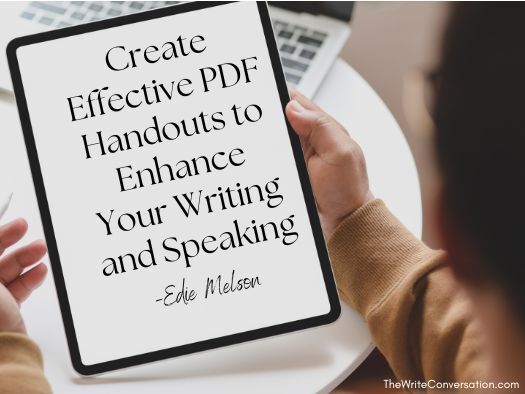
by Edie Melson @EdieMelson
Putting together a handout can be a tricky thing. It needs to stand alone and not leave those who refer back to it confused, but it also needs to be less than a word-for-word copy of what you’re teaching. In addition, the graphics need to complement the subject without out overpowering it. And finally, it needs to be something that won’t cost your students a fortune if they decide to print it out.
3 Components for a Successful HandoutValuable information (without being a script)Engaging graphicsPrintableMy favorite program to create PDF handouts is Canva.com. I have the pro version (paid) so I have access to all the necessary components. There is an excellent free version, but you’ll need to look elsewhere for graphics. I’ll share how to find those when we get to those steps.
I approach composing a handout using these components.
1. Brand. I try to create all my handouts in a similar style. I have my favorite fonts and graphic elements. And if I use color, I have a specific set of colors I always use. This means my handouts are recognizable no matter where my audience connects with me.
2. Title. This may seem obvious, but it’s critically important that your handout title is either the talk/class you’re presenting. Or, if it’s just a portion of the information presented be sure to use the EXACT wording you use when referencing it in your presentation.
3. Short intro. I like to give a short intro to make certain the person referencing the handout at a later time can immediately understand what is being shared. This isn’t the place for an illustration about why the info is important, just a straightforward sentence or two summing up what they’re about to read.
4. Format. I’m a stickler for scan-ability for notes. I want to make sure the person looking at the handout can immediately see the value and find the information they need. This means I look for ways to use lists, bullet points and bold headings.
5. Watermark. I want to provide handouts as additional information that can be used BY THOSE ATTENDING THE PRESENTATION at a later date. Sometimes I will spell out the fact that the material is copyrighted with this footer:
© Copyrighted Material. Do NOT reproduce without express written permissionEdie Melson • www.EdieMelson.com • Edie@EdieMelson.com
But most often I compose a footer that has my website and the page number (if the handout is more than 1 page long).
www.EdieMelson.com Page 1
6. Graphics. I try to find graphics that are simple and in black and white for ease in printing. Often I’ll use them in the title area. But sometimes I’ll use them at the bottom as well. Canva has an excellent variety, and they’re free if you have the pro version of Canva. If you don’t, you can visit www.Pixabay.com. This site has more than just images, they also have Vector graphics. You can do a search for the graphic you need, like calendar, and instead of image, choose to search for Vector graphic.
7. Bio. This one is optional. Sometimes I’ll include a short bio and headshot. It depends on the space I have and how familiar the audience is with me.
Graphic Design
Before we talk about creating the handout, let’s have a quick lesson on graphic design basics. There are certain things you want to keep in mind when you’re designing a handout so it’s aesthetically pleasing. Here are some conventions that will make your finished product look better.
1. Font Choices. This is a big one. Unless you are a graphic design expert who knows how to mix multiple fonts, keep your design simple. Two fonts is ideal and you want to avoid using more than 3 different fonts.
I usually choose two main fonts, one that’s a handwriting or script font, and one that’s a typeset font. Handwriting Fonts. You want to be careful and make certain EVERY letter is legible in the handwriting font you choose. Readability is a million times more important than using a font that’s pretty.Typeset Fonts. I prefer to use a typeset font that’s sans serif and has the ability for me to make it bold or italic. This gives me more options when I’m formatting the text and making the handout easy to read.
2. Font Size. I can’t give you a definite font size because different types of fonts vary widely in what’s readable. It’s important to experiment and make certain the font you’re using is readable in the size you’ve chosen.
Font Size can also be a valuable design tool. Using a larger size can emphasize words or phrases and sometimes this is a better choice than changing fonts completely.
3. Balance. Balance is different than symmetry. The best example I can think of is if you are decorating a fireplace mantle in your home. A symmetrical approach would be to have the exact same vase on either end, with a mirror hung exactly in the center. A balanced approach would be to have a vase with a flower arrangement that’s approximately 18 inches high on one end of the mantle, several paintings hung in the center and at the other end a stack of books with a small statue that all together is approx. 18 inches high. This is a simplistic explanation, but the point is balance doesn’t always match, but it’s always pleasing to the eye. And that “eye” takes time and practice to develop.
What’s the point of this? The point is your page should have balance, but doesn’t have to match.
4. Graphics. The graphic images I use fall into several general categories. Graphics that illustrate: These would be images like an evergreen bough I used to illustrate a handout I did on Evergreen Writing.Graphics that divide: These are usually some kind of line or linear graphic that give a visual break between sections or points.Graphics that group: These would be something that helps set off a point, like corners or a square around text. This can also be a frame around the entire handout page.A graphic element can be very subtle but still pack a big impact. Actually I think the judicious use of subtle graphics are what elevate handout from boring to extraordinary.
Other Things to Consider
Color. I recommend using color with a light hand. I try to keep the background of my handouts white. Otherwise if someone wants to print it out, it requires a color printer or at least extra ink if they’re printing it in grayscale.
If I’m doing something that I don’t expect or want printed out, I will sometimes use color to enhance the overall look. But even then, I use color lightly. Colors can appear very differently on different devices—from different brand or model computers to tablets to phones.
Also remember that your eyes read differently on a screen as opposed to a printed page. On a screen we need a high contrast—especially with poor lighting (poor lighting can mean low light or extreme bright light). That pale brown background with dark brown lettering is beautiful when printed, but a nightmare to read on a screen because the contrast isn’t sharp enough.
Using a Frame. Sometimes I like to use a frame around the entire handout. I tend to do this if the handout is short and has a lot of white space. I want my handouts to be perceived as valuable and that is often fed unconsciously by how “full” a page is.
Finally, save your handouts as a PDF, not a word document. This will ensure all the elements stay in place when your handout is printed.
These are my tips for creating a handout. I'd love to know what tips you have. Beside to leave your thoughts in the comments section below.
Don't forget to join the conversation!Blessings, Edie
NOTE: I've had a request for an example of one of my handouts, so here it is: How Writers Can Help Spouses Be Supportive
TWEETABLECreate Effective PDF Handouts to Enhance Your Writing and Speaking from @EdieMelson (Click to Tweet)
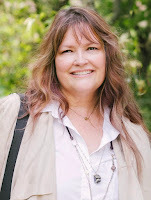 Edie Melson is a woman of faith with ink-stained fingers observing life through the lens of her camera. No matter whether she’s talking to writers, entrepreneurs, or readers, her first advice is always “Find your voice, live your story.” As an author, blogger, and speaker she’s encouraged and challenged audiences across the country and around the world. Her numerous books reflect her passion to help others develop the strength of their God-given gifts and apply them to their lives.Connect with her on her website, through Facebook, Twitter and on Instagram.
Edie Melson is a woman of faith with ink-stained fingers observing life through the lens of her camera. No matter whether she’s talking to writers, entrepreneurs, or readers, her first advice is always “Find your voice, live your story.” As an author, blogger, and speaker she’s encouraged and challenged audiences across the country and around the world. Her numerous books reflect her passion to help others develop the strength of their God-given gifts and apply them to their lives.Connect with her on her website, through Facebook, Twitter and on Instagram.
April 16, 2025
Christian Book Contests Elevate Authors and Enhance Careers
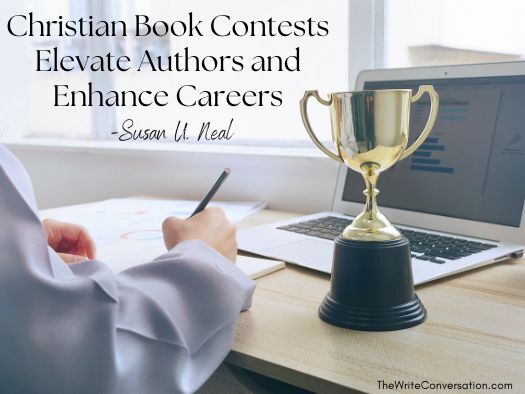
by Susan U. Neal RN, MBA, MHS @SusanNealYoga
In the world of Christian publishing, book contests play a fundamental role in elevating an author's profile and enhancing their book’s marketability. Every author should enter several contests. Winning an award demonstrates the quality of the book and elevates an author’s status, which may open doors to broader audiences and opportunities. For example, after my non-published Bible study won an award at a conference, an agent offered a contract to represent me.
The Power of Winning an Award
Winning a Christian book award has numerous benefits:Market Visibility: Awards attract attention from book buyers, libraries, and bookstores, increasing overall market visibility.Enhanced Credibility: Authors gain credibility as award-winning labels contribute to the book’s quality perception.Promotional Opportunities: Awards provide material for press releases, social media content, and interviews which boost promotional efforts.Career Advancement: Awards can lead to higher sales, more speaking engagements, and even publishing deals.
In 2018 my book, 7 Steps to Get Off Sugar and Carbohydrates won first place in the Christian living category of the Selah award. The next month the book’s sales rose from a modest fifty books a month to 250–400 books per month for the next seven month. Winning that award ignited that book’s sales.
Christian Book Contest List
The following comprehensive guide covers a range of Christian book awards, providing authors with opportunities to gain the recognition they deserve. Keep entering your book in contests until it wins.
American Book Fest Awards—This contest was established in 2003, and it highlights the diversity and richness within Christian fiction and non-fiction. Entry deadlines vary, with winners announced later in the year. For more information click here.
American Christian Fiction Writers (ACFW) Contest—From first-time authors to seasoned writers, the ACFW contests—including the First Impressions, The Genesis Contest, and The Carol Award—offer platforms for unpublished and published authors. These contests are celebrated for advancing the careers of Christian fiction writers. Check out the details at https://acfw.com/acfw-contests/.
Advanced Writers and Speakers Association (AWSA) Awards—The Golden Scroll Awards and Christian Market Book of the Year focus on recognizing excellence among authors and speakers in the Christian community. These awards are announced at the annual AWSA conference in August at https://awsa.com/. I always enter my books in this award and attend the spirit-filled conference.
Blue Ridge Mountains Christian Writers Award—These awards, including the Selah and Foundation Awards, are part of the Blue Ridge Mountains Christian Writers Conference. They honor excellence in Christian writing across genres, with a special emphasis on nurturing writers' spiritual and professional growth. This is another contest I don’t miss. Find more information here.
Christy Award—As one of the highest honors in Christian fiction, the Christy Award recognizes novels that represent the best, most impactful, and inspiring works in the industry. Winning this award can significantly enhance an author's reputation and book sales. Check out the details at https://www.christyawards.com/.
Christian Indie Awards—These awards highlight the achievements of independent Christian authors and small publishers. Offering recognition in various categories, they focus on the quality and message of Christian books. This contest offers a significant boost to an author’s platform through intensive marketing efforts for the winners. Be sure to enter at https://christianaward.com/.
Dragonfly Book Awards—The Purple Dragonfly and Royal Dragonfly Awards recognize excellence in children’s books and are great for authors aiming to impact younger audiences with Christian themes. Find out more here.
Illumination Awards—These awards specifically honor the year’s best new titles written and published with a Christian worldview. Recognizing books across a wide array of genres, the Illumination Awards (https://illuminationawards.com/) shine a light on the works that inspire faith.
Independent Publisher (IPPY) Book Awards—This award celebrates the achievements of independent authors and publishers and include a category for religious fiction and non-fiction. Winning an IPPY is a sign of excellence that can attract attention. Find more information at https://ippyawards.com/.
Moonbeam Children’s Book Award—This award celebrates exemplary children's books that inspire creativity, tolerance, and lifelong reading. Particularly focused on children’s literature, this award aims to honor books that support family values at https://moonbeamawards.com/.
Writing Conference Contests
In addition to the competitions listed above, there are contests at many Christian writer conferences. And these awards can be for articles, blogs, and many other categories that you may not find in a book contest. If you plan to attend a conference, be sure to check out and enter their competition. The Asheville Christian Writers Conference hosts the Sparrow Award and Devotion Contests here. The Blue Lake Christian Writers Conference hosts the Living Water Awards for published and unpublished works at https://bluelakecwr.com/living-waters-awards/.The Florida Christian Writers Conference hosts the SonShine Awards for unpublished works at https://word-weavers.com/conferencecontest.The Well Conference hosts the Oasis Awards for unpublished Christian fiction and nonfiction manuscripts at https://seeyouatthewell.net/contests/.In addition to book contests, there is a marketing contest, Christian Authors Network Excellence in Marketing Award. The top-place winner of this award wins a $1995 publicity package with Jones Literary public relations firm. Enter the contest at https://christianauthorsnetwork.com/marketing-award/.
For authors in the Christian literary market, entering book contests is not just about the potential to win but also about the opportunity to gain exposure, validate quality, and build a reputation within the community. Participating in these contests should be viewed not only as a chance to win but as a strategic move in an author’s career. These contests provide a multitude of opportunities to gain recognition. Which one do you plan on entering?
For more information on book contests and to explore additional resources for Christian authors, please visit CIPA.Podia.com which provides an extensive list of book contests, writer conferences, podcast media, and much more.
TWEETABLEChristian Book Contests Elevate Authors and Enhance Careers from @SusanNealYoga on @EdieMelson (Click to Tweet)
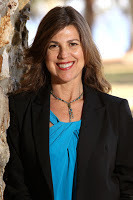 Susan U. Neal, RN, MBA, MHS: Susan’s mission is to improve the health of the body of Christ. She has her RN and MBA degrees, as well as a master’s in health science. She is a CERTIFIED HEALTH AND WELLNESS COACHwith the American Association of Christian Counselors. She published five books, the Selah award winner 7 STEPS TO GET OFF SUGAR AND CARBOHYDRATES, CHRISTIAN STUDY GUIDE FOR 7 STEPS TO GET OFF SUGAR AND CARBOHYDRATES, HEALTHY LIVING JOURNAL, SCRIPTURE YOGAa #1 Amazon best-selling yoga book, and YOGA FOR BEGINNERSwhich ranked #3. She published two sets of Christian Yoga Card Decks and two Christian Yoga DVDs that are available at CHRISTINAYOGA.COM. Her digital product HOW TO PREVENT, IMPROVE, AND REVERSE ALZHEIMER’S AND DEMENTIA is a great resource. To learn more about Susan visit her website SUSANUNEAL.COM You can also connect with Susan on FACEBOOK, TWITTER, and INSTAGRAM.
Susan U. Neal, RN, MBA, MHS: Susan’s mission is to improve the health of the body of Christ. She has her RN and MBA degrees, as well as a master’s in health science. She is a CERTIFIED HEALTH AND WELLNESS COACHwith the American Association of Christian Counselors. She published five books, the Selah award winner 7 STEPS TO GET OFF SUGAR AND CARBOHYDRATES, CHRISTIAN STUDY GUIDE FOR 7 STEPS TO GET OFF SUGAR AND CARBOHYDRATES, HEALTHY LIVING JOURNAL, SCRIPTURE YOGAa #1 Amazon best-selling yoga book, and YOGA FOR BEGINNERSwhich ranked #3. She published two sets of Christian Yoga Card Decks and two Christian Yoga DVDs that are available at CHRISTINAYOGA.COM. Her digital product HOW TO PREVENT, IMPROVE, AND REVERSE ALZHEIMER’S AND DEMENTIA is a great resource. To learn more about Susan visit her website SUSANUNEAL.COM You can also connect with Susan on FACEBOOK, TWITTER, and INSTAGRAM.
April 15, 2025
Spring Forward with Your Writing: It’s Time to Move in What God Has Planted

by Kennita (Kay) Williams
“There is a time for everything, and a season for every activity under the heavens.” Ecclesiastes 3:1 (NIV)
Spring is a season of awakening. What once looked lifeless begins to bloom. Hidden things rise. Seeds break through the soil, unapologetic and vibrant. Spring reminds us that delay is not denial—it’s preparation. And for writers and Christian communicators, this season invites a sacred momentum: It’s time to spring forward.
Too often, we treat our writing call like winter—quiet, buried, paused. We sit on the idea. We hesitate to send the email. We revisit the manuscript but let self-doubt talk us out of finishing the book. Meanwhile, the message God placed in us waits for our obedience, not our perfection.
What if this is the season when you finally steward the seed?
Ecclesiastes 3:1 tells us there is a time for everything. That includes your words. Your story. Your teaching. Your testimony. Everything God planted in you has a season, and spring is your holy reminder that dormancy does not equal death. It’s time to break through the soil.
Eternal Truths about Your Calling to Write
1. Your Calling Still Stands
Maybe you’ve wrestled with inconsistency. Maybe you feel like you’ve missed your window. But hear this clearly: the gifts and callings of God are without repentance (Romans 11:29). That means He hasn’t changed His mind about what He told you to write. He’s just waiting for you to move.
You may have paused. But heaven never put your purpose on hold. Even now, the Holy Spirit is watering what He’s planted in you. Let that truth reignite your confidence. Pick up the pen. Open the laptop. Revisit the vision. The time is now.
2. Small Steps Create Forward Motion
Springing forward doesn’t mean you need to write a 90-day devotional overnight. It simply means move. Take the next right step. Write the paragraph. Schedule the writing retreat. Submit the article. Begin the outline. Forward motion begins with small acts of obedience.
Ask yourself:What have I delayed that God has already greenlit?What one thing can I do this week to move forward in my calling?Where do I need to trust God more than my comfort zone?Sometimes the barrier isn’t a lack of creativity—it’s fear disguised as waiting. Don’t let “I’m still praying about it” become a spiritual excuse for procrastination.
3. Resurrection Power Lives in You
Spring is also the season we celebrate resurrection. The same power that raised Jesus from the grave lives in you (Romans 8:11). That power breathes life into dead places—including your confidence, creativity, and calling. You don’t have to do this in your own strength.
So many writers struggle with impostor syndrome, comparison, or feeling unqualified. But here’s the truth: God doesn’t call the qualified—He qualifies the called. And when He breathes on your words, they go further than you ever could on your own.
The dream is not dead—it’s dormant. Until now.
4. Write with Eternity in Mind
Spring forward, not just into activity, but into impact. We are not just content creators—we are kingdom communicators. Every blog post, devotional, podcast, or book is a seed that can shift atmospheres and bring souls closer to Jesus.
So don’t shrink back. You’re not writing to go viral—you’re writing to be faithful. And heaven measures fruitfulness, not followers.
Remember what Jesus said in John 15:16:
“You did not choose me, but I chose you and appointed you so that you might go and bear fruit—fruit that will last.”
Your words have eternal weight. Let that fuel you.
Final Encouragement:
This spring, may you rise like what God planted in you is ready—because it is. Don’t wait for the conditions to be perfect. Don’t wait until you feel 100% confident. Just move.
It’s time to spring forward. Not in striving, but in surrender. Not in hustle, but in Holy Spirit-led obedience.
Let the words flow.
Let the ideas blossom.
Let the calling bloom.
Your next step is the start of someone else’s breakthrough.
Prayer:Heavenly Father, thank You for the seeds You’ve planted within me. Forgive me for the times I’ve paused in fear or doubt. Today, I choose to trust You and spring forward in obedience. Breathe fresh life into every gift, idea, and assignment You’ve given me. Let my words bear fruit that glorifies You and blesses others. In Jesus’ name, Amen.
TWEETABLESpring Forward with Your Writing: It's Time to Move in What God has Planted from Kennita (Kay) Williams on @EdieMelson (Click to Tweet)
Dr. Kennita “Kay” Williams is a Visionary Leadership Coach, Author, Resilience Expert, and Wellness Advocate. Through her Business/Ministry, Clear Vision, she empowers leaders to navigate challenges, gain clarity, and lead with purpose. Dr. Kay’s mission is to inspire wholeness and healing. She can be contacted at www.clearvisionleader.com



